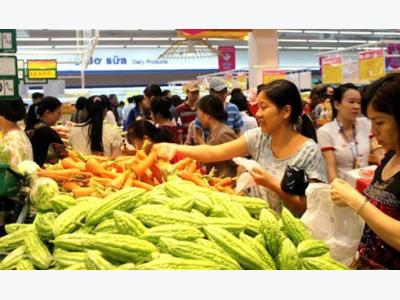Demand growing for safe food, proper labelling in Vietnam

The number of supermarkets in Vietnam has been steadily rising over the past decade, having gone from just 47 in 2005 to 975 in 2016, according to Hong Kong market research firm Cimigo.
The rise in supermarkets bears a direct correlation to the increased purchasing power of Vietnamese households, researchers at Cimigo postulate, citing the number of households earning over US$500 monthly has more than doubled during the same period.
In raw numbers, they note the number of high-income households went from 1.8 million in 2005 to more than four million in 2016.
This relationship between household income and supermarkets is vitally important for those farmers, businesses and other organizations operating in the agriculture and related food segments to understand, says PhD Dao The Anh.
Mr Anh, who is the Director at the Centre for Agricultural Research and Development in Hanoi, says the phenomena reflects a heightened interest by Vietnamese consumers in food safety.
These higher income consumers will no longer accept the items put on the store shelves as safe and are digging deeper into the food chain and developing an increased awareness of where the food originates and its processing.
Mr. Anh adds that these higher income consumers are also now requiring more informative labeling on foods such as fresh vegetables.
In a live market, consumers can buy fresh produce at a much lower price, but with more money in their wallets, those with higher incomes are migrating to the supermarkets where they can judge for themselves whether the food is safe.
And they look to informative labelling to make the decision to purchase, says Mr Anh.
Most importantly, they are willing to spend more on fresh produce they deem to be safe than eat cheaper low quality food they are unsure about that is sold in the live markets.
A prevalent fear among these consumers is that the food may have originated in China. In Vietnam, it is universally accepted that food that originates in China is unsafe for human consumption.
As a result, farmers and other businesses in the agriculture and food segments need to pay more attention to labelling of their products. Those that don’t will ultimately pay a steep price in loss of sales to the higher income consumers, Mr. Anh warns.
Of note, Mr Anh points out that most all small and most large business concerns in Vietnam have in the past ignored food safety and labelling, possessing a take it or leave it attitude towards consumers.
That is, except for VinEco, a subsidiary of VinGroup, says Mr Anh.
VinEco put food safety at the top of its business strategy early on and has been making big investments totaling in the hundreds of millions of US dollars to ensure its customers that its foods— are safe and properly labelled.
Organic and safe foods are still in short supply in local markets throughout Vietnam, cautions Mr Anh, but farms are gradually making the transition to shift to organic fertilizers.
That explains why in large part VinEco made the decision to produce safe foods themselves. There simply was no alternative supply other than importing fresh vegetables and other produce from foreign markets at cost prohibitive prices.
Consumer purchasing behaviour is changing rapidly, says Mr Anh, noting it’s the conduct of the farmers that is not shifting fast enough. If farmers want to meet market demand they must make the transition to organic with good packaging and labelling.
Otherwise consumers will bypass their products in favour of other products and a cheap price is not the decisive factor in making the decision to purchase, Mr Anh concludes.
Related news
 Central Highlands urged to ensure macadamia expansion efficiency
Central Highlands urged to ensure macadamia expansion efficiency Further studies should be carried out on land, climate, cultivating techniques, and seedlings before macadamia are put into large-scale cultivation
 Viet Nam rice exports drop in Q1
Viet Nam rice exports drop in Q1 VietNam exported an estimated 1.28 million tonnes of rice in the first three months of the year, earning US$570 million. But the exports were 18 per cent lower
 Workshop discusses organic production in Vietnam
Workshop discusses organic production in Vietnam A workshop on ‘Organic Vietnam: Development Trends’ was held on March 27 by the Ca Mau Department of Agriculture and Rural Development (DARD).